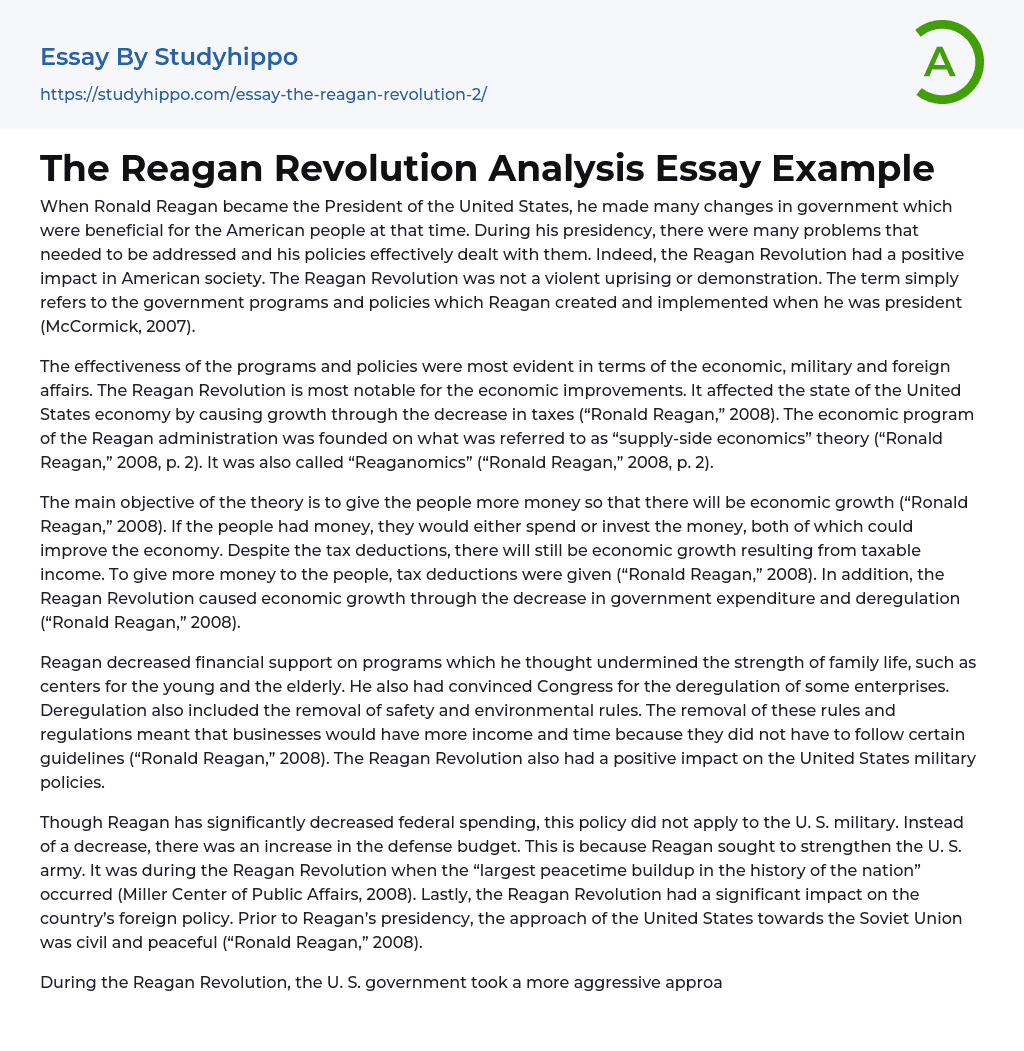When Ronald Reagan became the President of the United States, he made many changes in government which were beneficial for the American people at that time. During his presidency, there were many problems that needed to be addressed and his policies effectively dealt with them. Indeed, the Reagan Revolution had a positive impact in American society. The Reagan Revolution was not a violent uprising or demonstration. The term simply refers to the government programs and policies which Reagan created and implemented when he was president (McCormick, 2007).
The effectiveness of the programs and policies were most evident in terms of the economic, military and foreign affairs. The Reagan Revolution is most notable for the economic improvements. It affected the state of the United States economy by causing growth through the decrease in taxes (“Ronald Reagan,” 2008). The economic program of the Re
...agan administration was founded on what was referred to as “supply-side economics” theory (“Ronald Reagan,” 2008, p. 2). It was also called “Reaganomics” (“Ronald Reagan,” 2008, p. 2).
The main objective of the theory is to give the people more money so that there will be economic growth (“Ronald Reagan,” 2008). If the people had money, they would either spend or invest the money, both of which could improve the economy. Despite the tax deductions, there will still be economic growth resulting from taxable income. To give more money to the people, tax deductions were given (“Ronald Reagan,” 2008). In addition, the Reagan Revolution caused economic growth through the decrease in government expenditure and deregulation (“Ronald Reagan,” 2008).
Reagan decreased financial support on programs which he thought undermined the strength of family life, such as centers for
the young and the elderly. He also had convinced Congress for the deregulation of some enterprises. Deregulation also included the removal of safety and environmental rules. The removal of these rules and regulations meant that businesses would have more income and time because they did not have to follow certain guidelines (“Ronald Reagan,” 2008). The Reagan Revolution also had a positive impact on the United States military policies.
Though Reagan has significantly decreased federal spending, this policy did not apply to the U. S. military. Instead of a decrease, there was an increase in the defense budget. This is because Reagan sought to strengthen the U. S. army. It was during the Reagan Revolution when the “largest peacetime buildup in the history of the nation” occurred (Miller Center of Public Affairs, 2008). Lastly, the Reagan Revolution had a significant impact on the country’s foreign policy. Prior to Reagan’s presidency, the approach of the United States towards the Soviet Union was civil and peaceful (“Ronald Reagan,” 2008).
During the Reagan Revolution, the U. S. government took a more aggressive approach towards the USSR and other countries that supported communism. The enhancement of the U. S. military caused great tension in the relationship between the United States and the USSR. The most relevant foreign policy which was caused by the Reagan Revolution was the Strategic Defense Initiative (SDI). Though the SDI was military in nature, it was still important to foreign policy due to its influence on the U. S. -Soviet Union relations. The SDI allowed the U. S. o stop the missiles of the opponent before reaching the targets, which is the reason why Soviet Union opposed the
program.
It was also the Reagan Revolution that contributed to the end of the Cold War (McCormick, 2007). The Reagan Revolution is a significant part of American history. The programs and policies of the Reagan administration affected great change that was essential during that time. These programs and policies properly addressed the economic, military and foreign issues of that period. Therefore, the Reagan Revolution was indeed successful in its objectives.
- Federal government essays
- Armed Forces essays
- Confederate States Of America essays
- Federal Government Of The United States essays
- Fourteenth Amendment To The United States Constitution essays
- Governance essays
- Parliament essays
- Politics essays
- Jurisdiction essays
- Bureaucracy essays
- Separation Of Powers essays
- Congress essays
- President essays
- United States Congress essays
- Non-Commissioned Officer essays
- Appeal essays
- Revenge essays
- Corporate Governance essays
- Public Service essays
- Income Tax essays
- Supply essays
- Red Cross essays
- Democracy essays
- State essays
- Liberty essays
- Absolutism essays
- Reform essays
- Republic essays
- John Marshall essays
- Bourgeoisie essays
- Developed Country essays
- Elections essays
- International Relations essays
- Left-Wing Politics essays
- Monarchy essays
- Political Corruption essays
- Political Party essays
- Political Science essays
- Sovereign State essays
- United Nations essays
- World Trade Organization essays
- Contras essays
- Dictatorship essays
- Foreign policy essays
- Monarch essays
- Corruption essays
- Foreign essays
- Democratic Party essays
- European Union essays
- President Of The United States essays




